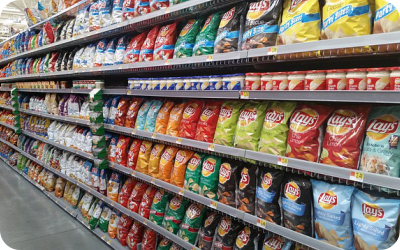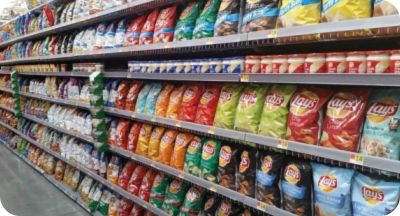Date: 08 Jan 2019

A number of companies of the size and prominence of Evian, Mars, Marks and Spencer, Pepsi, Coca-Cola, Unilever, Walmart, and L’Óreal announced their intentions to make their packages 100% recyclable within the next decade at the World Economic Forum in the end of 2018. This promise was received as a response to hundreds of thousands of consumers, who pressure the brands to take more responsibility and design more eco-friendly packages.
The problem, however, is not only plastic itself, but the fact that it is thrown away in an improper way, without being recycled. Flexible packages can help to save energy and transport costs. The plastic film, which covers cheese or meat, for instance, is the definition of plastic waste. However, at the same time, it can be useful in the food industry, because it prolongs the life span of the foods.
The food and beverage industry has a great impact on the environment, since it contributes to climate change, water pollution, loss of biodiversity, soil exhaustion, and nitrogen and phosphorus loading.
In addition, food waste is a major source of greenhouse gas emissions, mostly in the form of methane. This gas is even more harmful to nature than carbon dioxide which is emitted during the production of plastic. Nevertheless, flexible food packages are very hard to separate and recycle, and most of them end up in the landfill, rather than a factory for recycling.
Many companies in the food industry are taking additional steps to reduce their negative impact on the environment. They are streamlining their assembly lines, banning plastic straws and urging their customers to use reusable shopping bags rather than plastic bags. With these positive changes and advice, they expect to affect consumer actions in positive way. But in order to reduce their impact on the climate and the environment, all companies need to do more.
One of the possible solutions of this problem is in-mold labeling. This type of labeling is characterised by the fact that the label and the package are fused together and thus make the whole product container completely recyclable. Moreover, in-mold labels are lighter and stackable, which makes them easier to transport.
In this regard, Dilcom Bulgaria has invested in a new machine for production of labels suitable for injection molding, blow molding or thermoforming. It is used for manufacturing and printing labels, which can be integrated in product packages. It has been fully functional since the end of February 2022. The machine can be used for any type of label such as address labels, return labels (e.g. for royal mail labels and invoice papers), identification labels, free sample labeling, etc.
In-mold labeling is definitely not the only solution in the war against plastic. However, it for sure can help as it is a very good and easily applied solution for making product packaging less harmful.
Dilcom Bulgaria produces in-mold labels and many other types of labels which you can view from our website and online store. They are a high-quality solution for labeling various kinds of products and packaging. We also offer labels made entirely of recycled materials, and recyclable labels. For more information regarding in-mold labeling (iml) or to order integrated labels, please contact our specialists at sales@dilcom.com.


Post comment